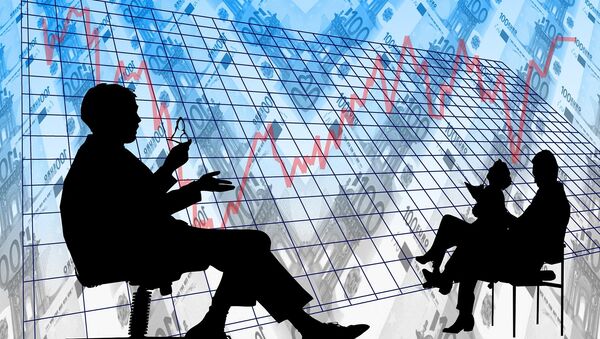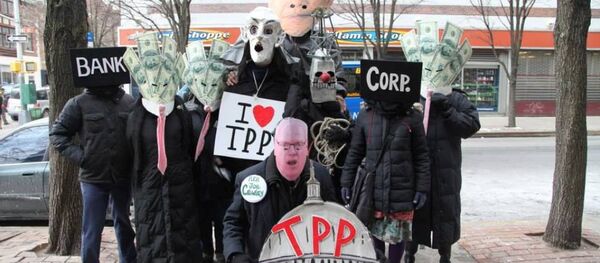With some concerns about the state of the Chinese economy, coupled with dropping commodities prices and rate rises in the US, some economists have predicted a dire 2016 for global financial markets, with others warning about the prospect of a global financial crisis on the scale of the 2008 crash.
What does 2016 hold for the global economy? @Lagarde https://t.co/91bqganw64 pic.twitter.com/Rk8uakzAfr
— World Economic Forum (@wef) January 13, 2016
Despite these concerns, fears of a second major financial crash in a decade are exaggerated, the Chief Investment Officer (CIO) of one of the UK's largest investment funds has told Sputnik.
"There's no way that 2008 is going to happen again. 2008 was driven by extreme leverage in the banking sector. That no longer can happen. Now the banking system is relatively well sured up, so the financial system is not going to break down."
While fears of a major financial crash are not realistic according to Sputnik's source, investors should brace themselves for a "volatile" year with "vicious" let downs in stock markets.
Pessimists Warn of Cataclysmic 2016
The calls for calm come after analysts from the Royal Bank of Scotland's (RBS) Rates Research team warned investors to expect a "cataclysmic year" in 2016, with predictions of a serious slump in stock markets and commodities prices.
"Sell everything except high quality bonds. This is about return of capital, not return on capital. In a crowded hall, exit doors are small," the analysts wrote in a report sent out to clients.
SocGen's Albert Edwards latest market forecast is out pic.twitter.com/l21HDZ2MOp
— Mark Constantine (@vexmark) January 13, 2016
Although the report was representative of the views of the individual analysts and not the RBS itself, it has triggered concerns about the stability of the global economy in 2016.
Longstanding City of London pessimist Albert Edwards from the investment bank Societe Generale echoed the grim sentiments, saying the world is heading for a global financial crisis on the scale of the 2008 crash.
Speaking at an investment conference in London, Edwards said the deflation in emerging market economies would push the world into another severe financial crash.
"Developments in the global economy will push the US back into recession. The financial crisis will reawaken. It will be every bit as bad as in 2008-09 and it will turn very ugly indeed," he said.
Another crash on the scale of 2008 could lead to the break-up of the euro single currency, Edwards warned, arguing that France, Spain and Italy would not accept the rising unemployment associated with another recession.
"What a disaster the euro has been: it is a doomsday machine in favor of the German economy."
Three Main Factors: US, China, Oil
According to Sputnik's source, much of the pressure on global markets stems from the US interest rate rise, which has subsequently made the US dollar stronger and subsequently passed on impacts to emerging markets.
"That puts emerging markets under pressure for a couple of different reasons. A lot of the debt in emerging market countries is denominated in US dollars. So you've got countries like Mexico and Brazil, where their debt is denominated in US dollars, which means that they've got to pay investors in dollars. So, if their currencies come under pressure then that becomes more costly for them."
Another major factor is related to the Chinese economy.
As economy slows and markets crash, #China’s era of easy choices is over https://t.co/PgwQgTc2SB pic.twitter.com/4UnX9fgr12
— Pedro da Costa (@pdacosta) January 8, 2016
Weak manufacturing data triggered the sell off of stocks in Chinese markets earlier this year, with experts raising concerns over controls being applied in the Chinese market.
This has sparked fears of an inevitable "hard landing" in China, which could have a "vicious" impact on the price of investments.
"China cannot continue to use its vast reserves in order to prop up their underlying economy, and at the same time they're trying to change from a manufacturing economy to a service economy… So something has to give at some point in time."
This, coupled with the thawing relationship between Iran and the abundance of energy resources globally has driven down commodity prices, placing incredible strain on commodity rich countries like Saudi Arabia.
"You don't have one effect happening, you've got a multitude of things that are happening that are causing these effects," the CIO said.
"US interest rates going up was the start of it, commodities prices going down was another part of it, because people are worried about the demand in China. China then has its own issues, which then has its own impact. I think markets will be extremely volatile."




